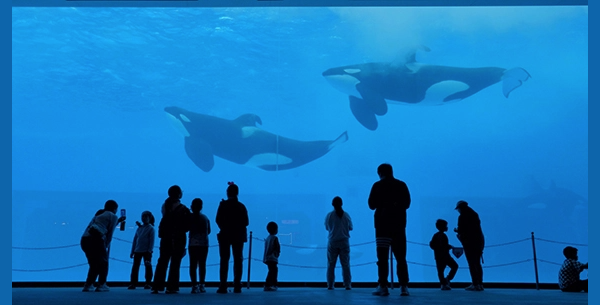Expanding Chinese ocean theme park industry continues to perpetuate conservation and welfare problems
||| FROM MARJORIE FISHMAN for ANIMAL WELFARE INSTITUTE |||
Washington, DC (December 19, 2024)— Investigators have confirmed that, for the first time, China has overtaken the United States as holder of the highest number of captive orcas (22). A report released today by the China Cetacean Alliance (CCA) — a coalition of international and Chinese animal welfare organizations — indicates that most of these orcas are on public display with minimal welfare safeguards.
OCEAN THEME PARKS: China’s Growing Captive Cetacean Industry (2019-2024), now in its third edition, aims to raise awareness of the serious welfare and management issues associated with the capture of free-ranging whales, dolphins, and porpoises and their subsequent holding in ocean theme parks in mainland China.
As the international community’s appetite for watching whales and dolphins perform tricks in tanks has waned, China has gone in the opposite direction. Of the country’s 22 captive orcas, 15 were imported from Russia’s Sea of Okhotsk and seven were captive-born. In the United States, a total of 18 captive orcas are held at three SeaWorld parks. Most of China’s orcas were only put on display in fall 2023, in a brand-new facility in Zhuhai called Chimelong Spaceship.
As of July 2024, 101 captive cetacean facilities were operating in China, with an additional 11 under construction. This is more than double the number documented in CCA’s 2015 report and an increase of five since 2019.
Chinese theme parks house an estimated 1,307 cetaceans representing 15 species. Apart from captive orcas, China is also the world leader in the number of captive bottlenose dolphins (more than 730) and beluga whales (about 145). Since Russia banned the live capture of orcas and belugas for entertainment in 2018, China has increasingly focused on breeding and imports from Japan to meet demand, according to the report.
“China is the market for wild-caught cetaceans, which has harmed its international reputation, destabilized free-ranging populations, and resulted in an unknown number of animal deaths,” said Dr. Naomi Rose, senior scientist in marine mammal biology at the Animal Welfare Institute, which is a founding member of CCA.
Rose last visited China in January 2024 to observe orcas living in facilities there. “The Chinese ocean theme park industry is incapable of meeting the complex physical and behavioral needs of cetaceans,” she said. “An increasing number of facilities offer visitors swim- or dive-with-cetacean experiences, putting the public at risk (as evidenced by the growing number of reported injuries), while failing to provide meaningful conservation information. Moreover, many animals are suffering from publicly documented trainer abuse and lack of specialized veterinary care.”
Detailed information on the status of the captive animals inside China’s ocean theme parks is difficult to obtain, as there is no publicly available information source. CCA’s report cites several troubling deaths, including those of two critically endangered Yangtze finless porpoises.
Additionally, the number of wild-caught cetaceans registered as imported to China in the database of the Convention on International Trade in Endangered Species of Wild Fauna and Flora (CITES) does not match export records from the originating countries, including Japan.
“With differences in the import and export data reaching over 380 individuals, this is an area of critical concern for the government and the industry and represents a potential violation of CITES regulations,” the report stated.
CCA recommends that China’s government adopt several measures, including launching independent investigations into CITES import data and captive cetacean welfare in China, prohibiting close contact activities between visitors and these animals, and preparing plans to phase out their display at ocean theme parks.
The Animal Welfare Institute (awionline.org) is a nonprofit charitable organization founded in 1951 and dedicated to alleviating animal suffering caused by people. We seek to improve the welfare of animals everywhere: in agriculture, in commerce, in our homes and communities, in research, and in the wild.
The China Cetacean Alliance (CCA) is a coalition of international animal protection and conservation organisations, comprising the Animal Welfare Institute (AWI), Born Free Foundation (BFF), Endangered Species Fund, Hong Kong Dolphin Conservation Society (HKDCS), Life Investigation Agency (LIA), Marine Connection, and Whale and Dolphin Conservation (WDC). The CCA raises awareness of the welfare issues associated with the capture of free-ranging whales, dolphins, and porpoises (also known as cetaceans) and their subsequent holding in ocean theme parks in mainland China.
**If you are reading theOrcasonian for free, thank your fellow islanders. If you would like to support theOrcasonian CLICK HERE to set your modestly-priced, voluntary subscription. Otherwise, no worries; we’re happy to share with you.**









As usual, when the US fails to show leadership (whether it’s about high-level problems like climate change and Russian imperialism or other problems like plastic waste and wildlife conservation), bad actors can go just a little further and say: “What’s the problem, the USA has always done this. We have a right to develop our economy just like they did.”